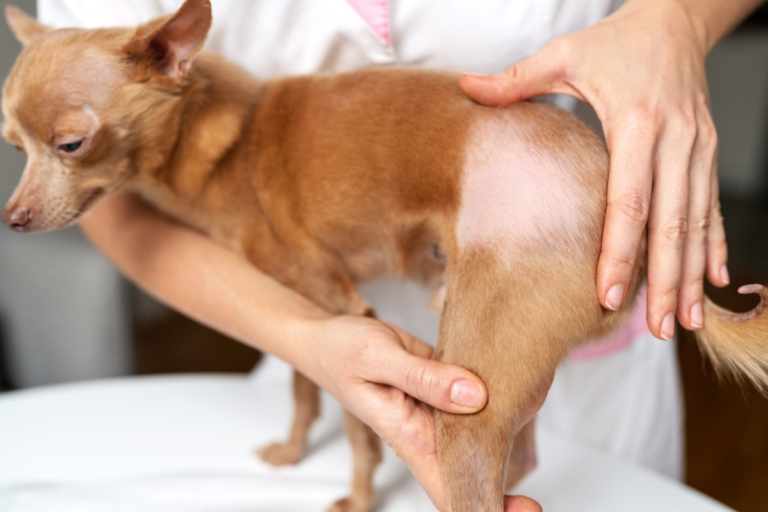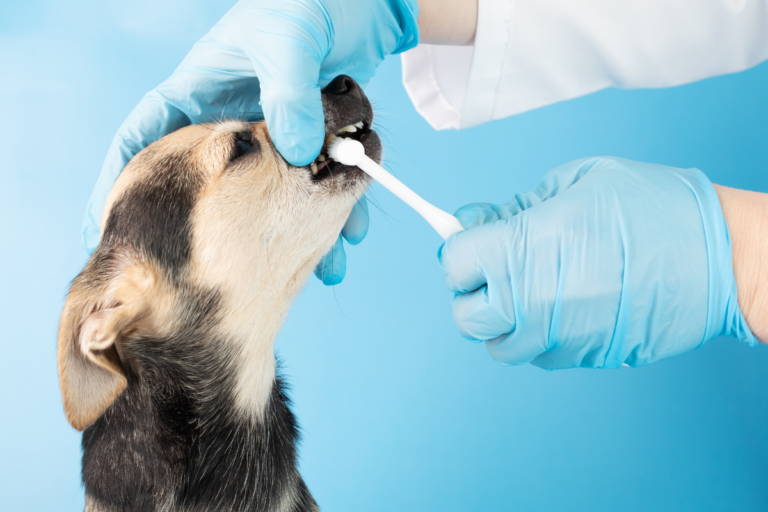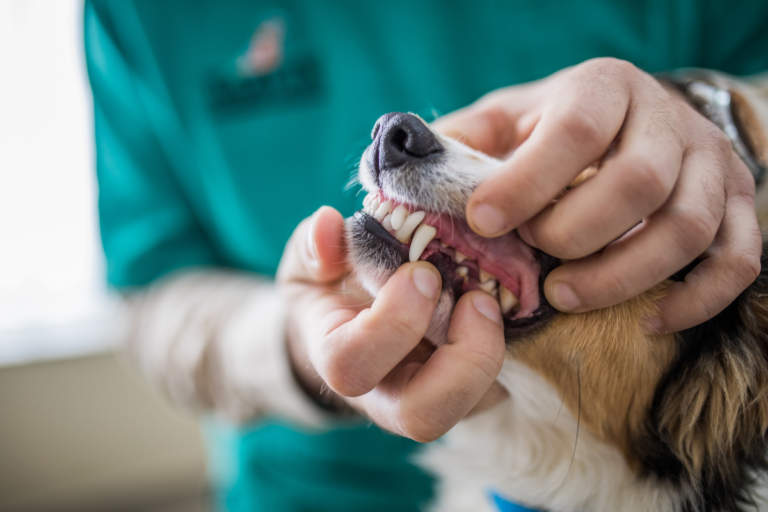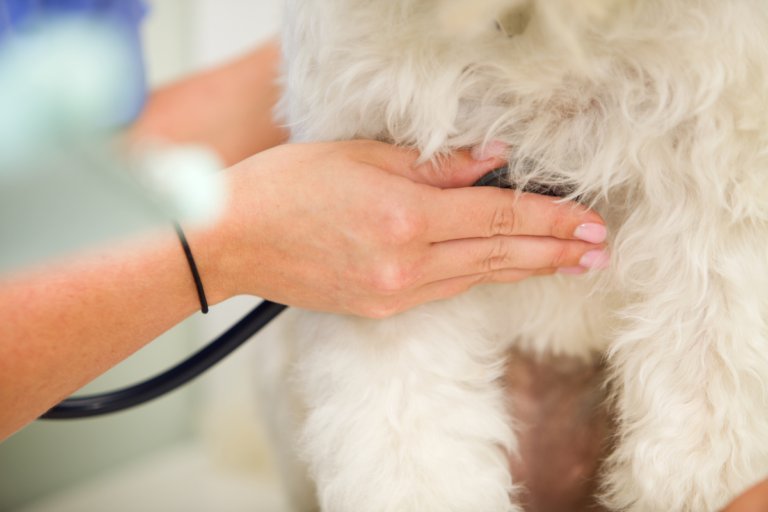Wellness First: Essential Guide to Understanding Dog Illnesses
Common Dog Diseases
Let’s keep our pups happy and bouncing by knowing what nasties are out there that could ruin their day. We’ll chat about some common doggy ailments – the ones that you might hear about during a chat with your vet or a neighbor who’s got a fur-baby too.
Infectious Diseases
Our four-legged pals can catch a bunch of illnesses, from pesky viruses and bacteria to weird fungi and tiny critters you can’t even see.
-
Viral Infections:
- Canine Distemper: This mean virus messes with a dog’s breathing, tummy, and brains. You’ll notice your pup running a fever, hacking, or even twitching. There’s a shot you’ll wanna keep up with to avoid this (AVMA).
- Canine Parvovirus: Bad news for puppies, this one is. Look for bad tummy woes and diarrhea with blood. Get those shots on time, folks! (AVMA).
- Canine Influenza: Similar to when you’ve got the sniffles – coughs and runny noses galore. There’s a shot for it, though not every dog gets it (AVMA).
-
Bacterial Infections:
- Leptospirosis: Dogs pick this one up from icky water or mud. Look out for tired pups, yellowing eyes, and kidney trouble.
- Lyme Disease: Those sneaky ticks spread this one. Your dog might get fevers, aches, and sore joints. (Read more about dogs and ticks).
-
Fungal Infections:
- Blastomycosis: This dude hides in the dirt, especially near lakes or rivers. Signs include fever, coughs, and nasty skin stuff.
- Ringworm: Not really a worm, but a nasty skin bug. It’ll make round bald spots show up on your pup (ringworm dog symptoms).
-
Protozoal Diseases:
- Giardiasis: Another tummy bug from funky water. Watch for diarrhea.
Parasitic Diseases
Tiny parasites can be a real pain in the tail. Whether living in or on your dog, they’ve got to go.
-
Internal Parasites:
- Heartworm Disease: Pesky mosquitoes gift these to our dogs. They curl up around the heart and lungs – yikes! Keep up with meds to stop them (dog heart disease).
- Hookworms and Roundworms: These hide out in the belly, causing stunted growth and the runs. They creep through dirty ground or poop.
-
External Parasites:
- Flea Infestation: Fleas cause furious itching, allergic flare-ups, and funky skin woes. Lasting external parasite prevention keeps ‘em away.
- Tick Infestation: Besides being gross, ticks pass off yucky stuff like Lyme disease and spotted fever. Check for tick symptoms.
| Disease | Type | Symptoms | How to Avoid |
|---|---|---|---|
| Canine Distemper | Friend-like Virus | Fever, hacking, shakes | Shots are your friend |
| Canine Parvovirus | Friend-like Virus | Vomiting, bloody poop | More shots |
| Canine Influenza | Friend-like Virus | Barking, runny nose, fever | Talk to your vet about shots |
| Lyme Disease | Bacteria Buddy | Fever, joint pain | Keep ticks at bay |
| Ringworm | Funky Fungus | Bald, round spots | Cleanliness, meds, and TLC |
| Heartworm Disease | Inside Bug | Cough, tired, possible heart aches | Take your meds kids |
| Flea Infestation | Outside Bug | Scratchy skin troubles | Flea meds |
Knowing what’s out there helps us keep an eye out for trouble and jump on it quick. Always have a heart-to-heart with the vet about dog diseases and what to do if things go south. Stay ahead and keep your dog waggin’!
Essential Vaccines
Our dogs deserve a chance at long, healthy lives, and vaccinations play a big part in that. They’re like shields, protecting our pups from nasty illnesses lurking about. This isn’t just a tick on the to-do list but a vital part of being a dog parent. Today, we’ll chat about three must-have vaccines every dog should get: Canine Distemper, Canine Parvovirus, and Canine Influenza.
Canine Distemper
Imagine a disease that attacks your dog’s breathing, digestion, and even their brain. That’s Canine Distemper, a nasty and often deadly bug. The American Veterinary Medical Association says this vaccine is a must—like putting on a seatbelt. It’s a powerhouse in stopping this terrible sickness right in its tracks.
Distemper Vaccine Schedule
| Age | Vaccine |
|---|---|
| 6-8 weeks | First vaccine |
| 10-12 weeks | Booster shot |
| 14-16 weeks | Final puppy shot |
| Every year or three years | Grown-up booster |
Canine Parvovirus
Canine Parvovirus is another baddie we need to block out, especially for puppies. It’s a vicious enemy that can lead to gut chaos, dehydration, and even worse. The AVMA agrees that fighting this with regular shots is a dog-lovers duty.
Parvovirus Vaccine Schedule
| Age | Vaccine |
|---|---|
| 6-8 weeks | First vaccine |
| 10-12 weeks | Booster shot |
| 14-16 weeks | Final puppy shot |
| Every year or three years | Grown-up booster |
Canine Influenza
We’ve all heard of the flu, right? Well, dogs get it too—it’s called Canine Influenza. This bug hits the breathing system and loves places where dogs hang out together, like parks and kennels. There’s a vaccine for it that can help lower the chances of your pup having a rough time with this one.
Influenza Vaccine Schedule
| Age | Vaccine |
|---|---|
| 6-8 weeks | First vaccine |
| 10-12 weeks | Booster shot |
| Every year | Adult booster |
Getting these vaccines is just the beginning of keeping our pooches in tip-top shape. Regular vet check-ups, pest control, and giving those pearly whites a brush are equally important. Want to be a canine health wiz? Check out our piece on dog diseases and symptoms and why regular vet visits are a must.
Sticking to these vaccine schedules means we’re doing our best to keep our doggos safe and sound, so they can enjoy tail-wagging adventures for years to come.
Health Risks in Dogs
Keeping our pups healthy is everyone’s top priority. Let’s chat about some of the common concerns, like heatstroke, bugs that bother them, and illnesses picked up during doggy playdates.
Heatstroke Symptoms
Heatstroke in dogs? Not something any of us want to deal with. When the temperature rises, so do the risks. Look out for:
- Panting like it’s going outta style
- Drool, drool, and more drool
- Nervous pacing
- Feeling weak or wobbly
- Gums looking pale, instead of a healthy pink
- Suddenly collapsing
Act fast if you spot these signs. Find some shade, use a wet towel for cooling, and get your fur-buddy to the vet pronto. Your dog’s life may depend on it! There’s more info on this over at bloat symptoms dog.
External Parasites
Oh, the creepy crawlies! Fleas, ticks, and mange mites love to hitch a ride on our four-legged friends, causing itchiness and bigger health problems. Let’s talk prevention:
- Fleas: Try flea collars or those easy-to-apply topical treatments.
- Ticks: Sprays, collars, and medications are your go-tos.
- Mange: Medicated shampoos and special skin treatments can help.
Your best bet? Give your vet a call to find the perfect fix for your pup’s needs. We dive deeper into the topic on dogs and ticks.
Social Setting Diseases
When dogs hang out together, it can be like kindergarten: a germ-fest! Here are some things to be aware of:
- Mange: Leads to itching, bald patches, and crusty skin.
- Ringworm: This isn’t actually a worm but a pesky fungus creating bald circles.
- Kennel Cough: A catch-me-if-you-can cough that jumps from dog to dog.
- Canine Influenza: Starts with a cough and fever—kinda like its cousin, kennel cough.
Drool, toys, and bedding shared amongst them can pass these along. Ask your vet about vaccines to keep these germs at bay. Discover more about these sniffles and sneezes in our sections on canine influenza and kennel cough.
Preventing Health Woes for Our Pups
We all want what’s best for our pups. Keeping them in tip-top shape means we should latch onto the idea of preventative care. It’s our way of making sure our doggos steer clear of any gnarly health issues. We’re diving into the things you gotta know—protecting against creepy crawlies, jabs to keep scary diseases away, and those ever-important vet visits.
Keep Those Pesky Parasites Away
Let’s face it—fleas, ticks, and mites are just the worst. They make our dogs all itchy and uncomfortable, not to mention the nasty stuff they can pass on. Fleas can drive your pup bonkers with itching and skin issues, and constantly losing blood isn’t good for anyone. Ticks? They’re the little vampires spreading Lyme and whatnot like it’s a holiday.
Arm your furry pal with the best defenses: monthly spot-on treatments, chewable pills, or those nifty collars that don’t mess around. Be extra cautious when the parasites are out in full force and be on the lookout for any weird signs. Want the nitty-gritty? Check out what’s up with dogs and ticks.
| Critter | What They Spread | How to Stop ‘Em |
|---|---|---|
| Fleas | Anemia, Itchy Skin | Spot-ons, Pills, Collars |
| Ticks | Lyme, Ehrlichiosis | Collars, Spot-ons, Pills |
| Mites | Mange | Vet Prescriptions, Grooming |
Get schooled on the itch and scratch symptoms with our guide on symptoms of ticks in dogs.
The Big Deal About Shots
Shots aren’t just for the humans—they’re a must for our fur babies too. Vaccines are like a superhero squad, taking down germs that would love to mess with your pet’s health. Core vaccines like the ones for distemper and parvo are must-haves for all dogs, according to the AVMA.
Now, not all vaccines are one-size-fits-all. Non-core ones, like the flu shot for dogs, depend on how your pup rolls. Your vet’s the go-to person for getting the deets on what your dog’s gonna need in the vaccine department. Get the scoop on dog diseases while you’re at it.
| Shot | Stops This | Core or Not? |
|---|---|---|
| Distemper | Distemper | Core |
| Parvo | Parvovirus | Core |
| Dog Flu | Canine Influenza | Non-Core |
Peep our article on deadly dog diseases to see what you’re keeping your pup safe from.
Hit Up the Vet Regularly
Don’t put off those checkups. Regular vet visits are like a health safety net for your pooch. They help catch and treat stuff early and those vet folks know a thing or two about what diet, exercise, or other care will best suit your little buddy. Keeping up on visits means spotting health hiccups like dog heart disease or dog diabetes symptoms before they crash the party.
| Dog’s Years | How Often to Visit | What Happens There |
|---|---|---|
| Adult Pooches | Annually | Full Body Check, Lab Tests |
| Senior Dogs | Twice a Year | Tests, Full Check, Health Monitoring |
Need more convincing? Give healthy hounds a whirl for a deep dive into why regular visits rock.
By staying on top of these care essentials, we ensure that our tail-waggers are living their best lives. Curious about specific health woes like dog gum disease or periodontal disease in dogs? We’ve got you covered with our in-depth guides.
Major Health Worries
Keeping our four-legged pals healthy is a big deal, and knowing about some common health hiccups they might face is part of the job. Let’s take a closer look at three dog-related health bumps in the road: cancer, ear infections, and heartworm disease.
Cancer in Dogs
As our pups get to enjoy longer lives (yay for advancements in vet care!), cancer tends to pop up a bit more often in the doggy world. We’re talking about types like skin, bone, and breast cancers trying to pull a fast one on us and our furry pals (Hope Crossing Animal Hospital). Classic red flags that your buddy might be having a cancer problem include:
- Those stubborn lumps
- Dropping pounds for no good reason
- Zonked out more often than not
- Skipping meals like they’re on a diet
Catching it early makes a world of difference. Vets might go in with the scalpel or try other treatments to give them a better shot at kicking cancer to the curb. Routine check-ups are like their secret weapon for boosting survival rates. Curious about more serious doggy ailments? Peek at our deadly dog diseases article for more scoop.
Ear Infections
Ear infections can really bug our doggos if left alone too long. Don’t ignore the signs like:
- Shaking their head like they’re in a rock band
- Going all-in with the ear scratching
- Red, swollen ear canals
- Mysteriously funky ears with goo or stink
Blame it on things like allergies, wet ears, strange objects, or tiny ear critters. A good cleaning routine and regular vet hugs can dodge many of these ear problems. For more ear stories and fixes, explore our symptoms of ear infections in dogs page.
Heartworm Disease
Heartworm is a nasty passenger mosquitoes smuggle in, hitting the heart and arteries of our furry kiddos (New Life K9s). An annual check-up secures them against this sneaky attacker. Keep an eye on symptoms like:
- Losing weight with no diet plan
- Pooch looking pooped all the time
- Struggling to breathe easy
- The good ol’ bark turns to a cough
- Upchucking unexpectedly
- Or no sign at all—sneaky, huh?
Prevention here is a piece of cake and as cheap as a cup of joe. Regular preventative meds keep heartworms out of the picture. Grab our dog heart disease article for a heart-to-heart with more details.
| Health Worry | Symptoms | Prevention | Treatment |
|---|---|---|---|
| Cancer | Lumps, dropping weight, tiredness, tweaking eating habits | Routine vet visits to catch it quick | Surgical nips and tucks, plus special treatments |
| Ear Infections | Acting like a head banger, ear scratch-a-thon, redness, goo, weird smells | Regular ear hygiene; keeping them dry and routine check-ups | Medicinal help; ear TLC cleanup |
| Heartworm Disease | Weight’s AWOL, looks worn out, panting, coughs, barfs, sneaky silence | Yearly blood checks and daily meds | Antibiotic therapy, meds for giving those worms the boot |
Never skip those vet chats—they’re lifesavers in spotting trouble before it escalates. For the nitty-gritty on keeping your buddy in tip-top shape, check out our section on preventative care.
Being in-the-know about what could trip up our dogs helps us play the hero role they deserve. Dig into our dog diseases and symptoms article to stay sharp and ready.
Dental and Skin Health
Taking care of our furry friends isn’t just about belly rubs and treats. Their dental and skin health deserve some love, too. Let’s talk about why brushing Fido’s teeth, keeping an eye out for ear troubles, and managing itchy skin really matters.
Dental Care Importance
Think of your dog’s dental health as the foundation of their happiness. Keeping those chompers clean isn’t just about avoiding doggy breath—it helps dodge some nasty stuff like dog gum disease and periodontal disease in dogs. Here’s why this matters:
The Upside to Good Dental Care:
- Stops plaque and tartar from setting up camp
- Cuts down on the risk of dental nightmares
- Your dog’s breath smells less like trash can vibes
- Helps them stay happy and healthy
We’ve all heard that brushing is key, and it’s no different for your dog. Grab those VOHC-approved dental products and get brushing. Plus, regular vet check-ups can catch any red flags in dogs’ teeth before they become bigger problems.
Symptoms of Ear Infections
Ear infections are a pain, literally. Dogs can get them from all sorts of things like moisture, allergies, or wax. (Providence Animal Hospital). Catching these early makes a world of difference.
Ear Infection Red Flags:
| Symptom | What’s Happening |
|---|---|
| Lots of Ear Scratching | Your pup’s trying to say something’s not right. |
| Head Shaking | Imagine having water stuck in your ear—annoying, right? |
| Whining or Odd Behavior | Even the toughest dog might whine if their ear’s bugging them. |
| Funky Smell or Goo | Anything weird coming from the ear isn’t normal. |
| Redness or Swelling | Signs that all is not well inside that ear canal. |
Fixing this usually means a good ear clean and some meds from your vet (Hope Crossing Animal Hospital).
For more on dealing with ear troubles, check out our page on symptoms of ear infections.
Itchy Skin and Skin Infections
An itchy pup can be a miserable one. Dogs scratch for all kinds of reasons, like allergies or infections, and figuring out the cause can lead to relief.
Why It’s Happening and What to Look For:
| Cause | Symptoms |
|---|---|
| Allergies | Non-stop scratching, nibbling, and licking |
| Bacterial Infections | Those raw spots and bald patches say it all |
| Yeast Infections | Greasy coat and a smell that turns heads, not in a good way |
These signs mean it’s time for a vet visit. They might suggest meds, switching up the food bowl contents, or a special shampoo (New Life K9s).
For more tips on dealing with itchy skin, pop over to our guide on itchy skin and skin infections.
Nailing down a solid routine for your dog’s teeth and skin keeps the common dog illnesses at bay. We’ve got piles of info on avoiding and tackling all sorts of doggy health issues in our sections on preventative care and major health concerns.






